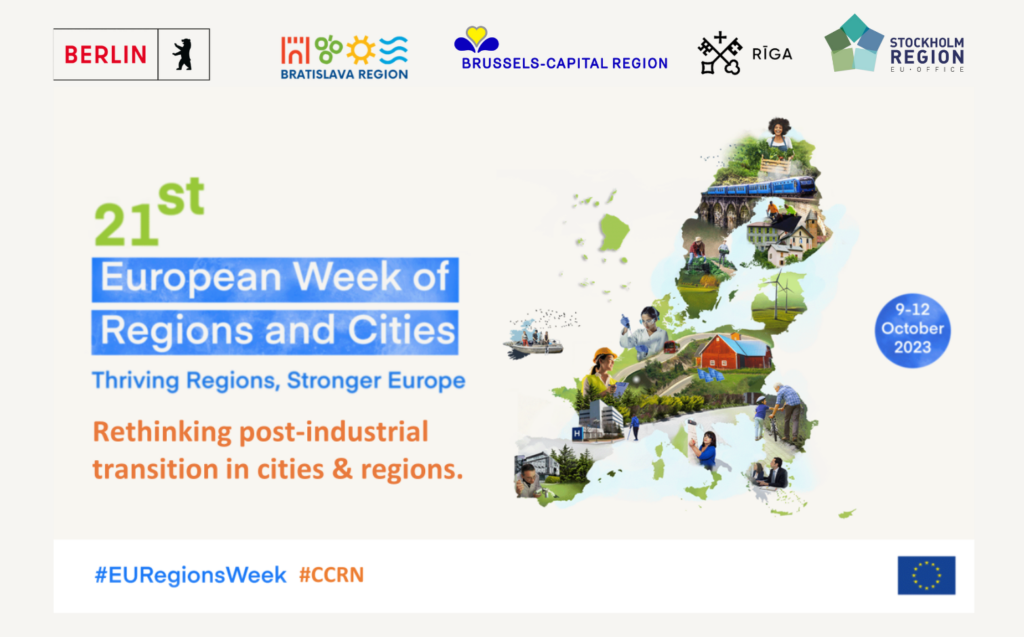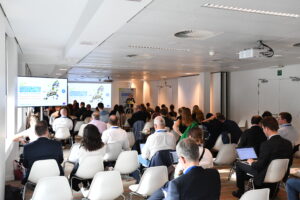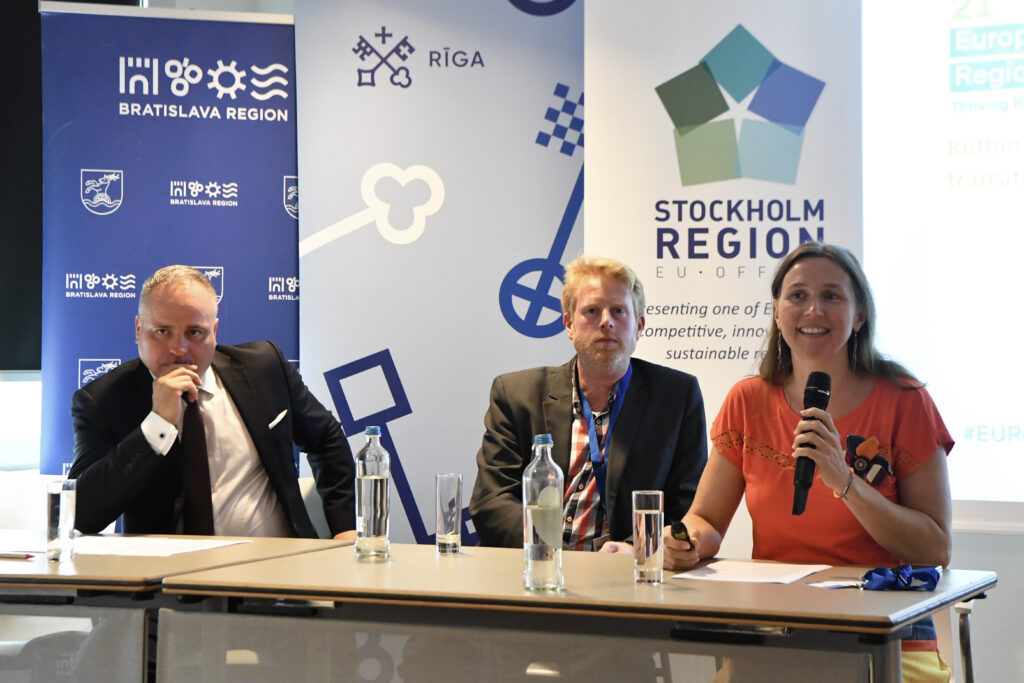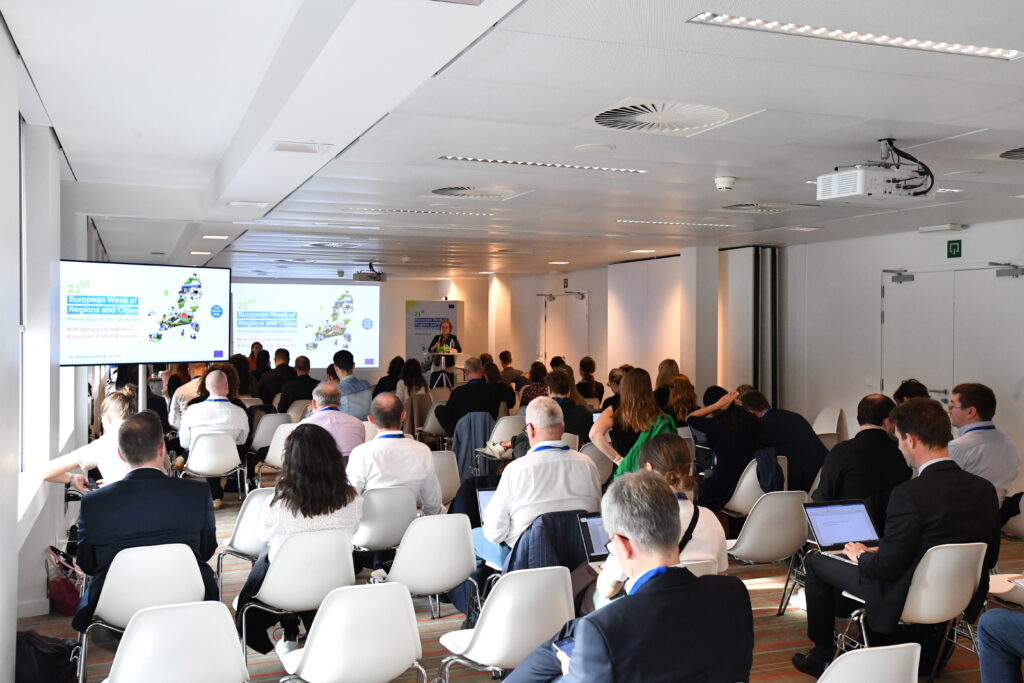
On the 11th of October, the Capital Cities and Regions Network (CCRN), which Stockholm Region EU Office is a part of, organised the workshop "Rethinking the post-industrial transition in cities and regions". The workshop took place during the European Week of Regions and Cities 2023 and aimed to discuss why EU policies, such as the Green Deal Industrial Plan, would benefit from considering cities’ and regions’ territorial perspectives. (Please find the version in Swedish below.)
Background
In early 2023, the European Commission presented the Green Deal Industrial Plan for the Net Zero Age. While the plan is a much welcomed and vital step, CCRN believes it does not fully consider the spatial conditions needed for implementation in cities and regions. It is essential that the Green Deal in general, and the Green Deal Industrial Plan more specifically, acknowledges the importance of spatial planning in cities and regions to achieve its objectives. Hence, the workshop explored important levers including the spatial conditions in the following 3 areas: environmental and energy solutions; innovation and digital solutions; and skills and inclusive societal solutions.
The workshop
 The workshop was organized by the Capital Cities and Regions Network (CCRN); this year represented by the Brussels based EU-representations of the city of Berlin, the Bratislava region, the Brussels-Capital region, the city of Riga and the Stockholm region.
The workshop was organized by the Capital Cities and Regions Network (CCRN); this year represented by the Brussels based EU-representations of the city of Berlin, the Bratislava region, the Brussels-Capital region, the city of Riga and the Stockholm region.
Ms. Anne Andersson, Managing Director of the Stockholm Region EU Office, introduced and moderated the workshop. The panelists underlined that local and regional authorities have an important role in the post-industrial transition and that EU policy would benefit from considering their perspective, regarding for example the Green Deal and the Green Deal Industrial Plan.
The workshop considered the territorial constraints and regular cooperation between city centres, peri-urban and rural areas when it comes to reindustrialisation. Developing productive areas in cities and regions can create local value-chains, stimulating a local, circular, and decarbonised economy and more efficient technologies. Moreover, reindustrialization is an opportunity for providing new jobs located within the city or close to the cities, and also to ensure social inclusion.
The presentations
 Mr. Juraj Droba, President of the Bratislava Region, listed productivity, science, research, innovation, and the automotive sector as characteristics of the region. Mr. Droba also highlighted the green transition, skills, and the conditions of the labor market as regional focus points. The presentation underlined the regions’ need to keep, create and attract qualified workers with flexible and adaptive skills that fit both current and future labor markets, retaining talent and preventing brain-drain. According to Mr. Droba, the education system needs to be adapted to the needs of society, for example through developing and providing vocational education programmes and initiatives fostering life-long learning. Mr. Droba argued that research, innovation, and science need more funding to realize these necessary changes.
Mr. Juraj Droba, President of the Bratislava Region, listed productivity, science, research, innovation, and the automotive sector as characteristics of the region. Mr. Droba also highlighted the green transition, skills, and the conditions of the labor market as regional focus points. The presentation underlined the regions’ need to keep, create and attract qualified workers with flexible and adaptive skills that fit both current and future labor markets, retaining talent and preventing brain-drain. According to Mr. Droba, the education system needs to be adapted to the needs of society, for example through developing and providing vocational education programmes and initiatives fostering life-long learning. Mr. Droba argued that research, innovation, and science need more funding to realize these necessary changes.
 Mr. Steffen Terlberl, CEO of Berlin Zukunftsorte, initiated his presentation with a historical background of the city which underlined the post-war period when Berlin was deindustrialized. Berlin has since then become a success story due to the development of science parks; the so called “Zukunftsorte”, and a renewed focus on science which required much public funding to be invested. Mr. Terberl identified fostering innovation and attracting companies as important goals for the city and pointed out that these goals can be achieved through establishing science parks where science and economics work together. Mr. Terberl found that reindustrialization remains a central concept in Berlin. Going forward, the EU needs to focus on the green transition and digitalization as important tools to accomplish necessary change. A key message of the presentation was that Europe and Berlin need to strengthen competitiveness through European production, while realizing a green and digital transition.
Mr. Steffen Terlberl, CEO of Berlin Zukunftsorte, initiated his presentation with a historical background of the city which underlined the post-war period when Berlin was deindustrialized. Berlin has since then become a success story due to the development of science parks; the so called “Zukunftsorte”, and a renewed focus on science which required much public funding to be invested. Mr. Terberl identified fostering innovation and attracting companies as important goals for the city and pointed out that these goals can be achieved through establishing science parks where science and economics work together. Mr. Terberl found that reindustrialization remains a central concept in Berlin. Going forward, the EU needs to focus on the green transition and digitalization as important tools to accomplish necessary change. A key message of the presentation was that Europe and Berlin need to strengthen competitiveness through European production, while realizing a green and digital transition.
 Ms. Stéphanie Lepczynski, Policy Adviser within Scientific Research and European Affairs at the office of the Brussels Secretary of State Ms. Barbara Trachte, showcased how a comprehensive rethinking of economic measurements can deepen the understanding of social and environmental challenges. The “Doughnut Economics” theory was invented by an English economist, Kate Raworth, and proposes a change of economic model as a response to pressing global challenges, aiming for society to develop within social and environmental limits. “The Brussels Donut”, represents this new and innovative compass for the economy implemented within the Brussels-Capital Region, and reflects Brussels’ vision of going beyond conventional GDP and growth metrics. Ms. Lepczynski underscored the region’s commitment to aligning non-green policies with environmental objectives through its ‘Brussels Green Deal’, recognizing the pivotal role of economics in achieving these goals. Ms. Lepczynski also emphasized the role of cities and regions as ideal testing grounds for forward-thinking ideas and their successful implementation, in collaboration with higher public authorities like the EU.
Ms. Stéphanie Lepczynski, Policy Adviser within Scientific Research and European Affairs at the office of the Brussels Secretary of State Ms. Barbara Trachte, showcased how a comprehensive rethinking of economic measurements can deepen the understanding of social and environmental challenges. The “Doughnut Economics” theory was invented by an English economist, Kate Raworth, and proposes a change of economic model as a response to pressing global challenges, aiming for society to develop within social and environmental limits. “The Brussels Donut”, represents this new and innovative compass for the economy implemented within the Brussels-Capital Region, and reflects Brussels’ vision of going beyond conventional GDP and growth metrics. Ms. Lepczynski underscored the region’s commitment to aligning non-green policies with environmental objectives through its ‘Brussels Green Deal’, recognizing the pivotal role of economics in achieving these goals. Ms. Lepczynski also emphasized the role of cities and regions as ideal testing grounds for forward-thinking ideas and their successful implementation, in collaboration with higher public authorities like the EU.
Please find the full presentations here.
The discussion
 Following the three presentations, the panelists deliberated on the potential gap between the imperative steps for a sustainable transition and public readiness, discussing how to best get people onboard. Here, the consensus highlighted the necessity of positive motivation and transparent communication.
Following the three presentations, the panelists deliberated on the potential gap between the imperative steps for a sustainable transition and public readiness, discussing how to best get people onboard. Here, the consensus highlighted the necessity of positive motivation and transparent communication.
Responding to a question regarding what other metropolitan regions can learn from Berlin, the discussion emphasized the critical significance of democracy and preserving public trust. Berlin’s success story was attributed to its enthusiastic support for entrepreneurship, scientific innovation, and an inclusive, open-minded approach. These elements were identified as instrumental in propelling progress within cities and regions.
A question about the possibility of employing alternative indicators for distributing the EU Cohesion Fund reintroduced the “donut” as an economic concept. This innovative indicator, aligned with the Sustainable Development Goals (SDGs), offers a holistic, 360-degree perspective that encompasses social foundations. This comprehensive approach therefore makes it challenging to selectively prioritize specific goals while neglecting others, and illustrates the need to make coherent decisions to foster the green transition.
Anne Andersson, Managing Director of the Stockholm Region EU Office, summarized the workshop as having introduced “hopeful stories, good examples and European solutions”.
Learn more
CCRN’s EWRC workshop 2022
About CCRN
The Capital Cities & Regions Network (CCRN) is the informal network of the capital cities and regions of the European Union’s and the European Economic Area’s member states. In 2002, the CCRN members came together to defend their common interests at EU level and voice the need for a distinct urban dimension in EU cohesion policy. Since then the CCRN has elaborated various positions concerning Cohesion Policy.
The main EU files targeted are Cohesion policy, Regional and urban development, Integrated territorial investments, Metropolitan areas, Internal market. Please find more information in the EU transparency register here.
/Rebecca Timm, Strategic Communicator, Amanda Lindell, trainee and Hedvig Pontén, trainee at Stockholm Region EU Office in Brussels.
—————————————————————————————————————————————————————————————————————–
Bakgrund
Under tidigt 2023 presenterade Europeiska kommissionen industriplanen för den gröna given. Medan planen är ett mycket välkomnat och viktigt steg anser CCRN att den inte till fullo tar hänsyn till de geografiska förhållanden som behövs för implementering i städer och regioner. Det är väsentligt att den gröna given i allmänhet och industriplanen för den gröna given i synnerhet erkänner vikten av fysisk planering i städer och regioner för att uppnå sina mål. Därför utforskade panelsamtalet viktiga hävstänger, inklusive territoriella förhållanden, inom följande tre områden: miljö- och energilösningar; innovation och digitala lösningar; och kompetens och inkluderande samhällslösningar.
Seminariet
 Panelsamtalet organiserades av the Capital Cities and Regions Network (CCRN), som i år representerades av de Brysselbaserade EU-representationerna tillhörandes Berlin, Bratislava-regionen, Bryssels huvudstadsregion, Riga och Stockholmregionen.
Panelsamtalet organiserades av the Capital Cities and Regions Network (CCRN), som i år representerades av de Brysselbaserade EU-representationerna tillhörandes Berlin, Bratislava-regionen, Bryssels huvudstadsregion, Riga och Stockholmregionen.
Anne Andersson, VD för Stockholmregionens Europakontor, inledde och modererade panelsamtalet. Panellisterna underströk att lokala och regionala myndigheter har en viktig roll i den postindustriella omställningen och att EU policy skulle dra nytta av att beakta deras perspektiv, till exempel när det gäller industriplanen för den gröna given och den gröna given.
Panelsamtalet beaktade territoriella begränsningar och regelbundet samarbete mellan stadskärnor, stadsnära områden och landsbygd när det kommer till återindustrialisering. Utvecklandet av produktiva områden i städer och regioner kan skapa lokala värdekedjor som stimulerar en lokal, cirkulär och koldioxidreducerad ekonomi och mer effektiva teknologier. Dessutom är återindustrialisering en möjlighet för att skapa arbeten i eller nära städer, samt för att säkerställa social inkludering.
Presentationerna
 Juraj Droba, ordförande i Bratislavas regionfullmäktige, listade produktivitet, vetenskap, forskning, innovation och fordonssektorn som karaktärsdrag för regionen. Droba lyfte även fram den gröna omställningen, färdigheter och arbetsmarknadsvillkor som regionala fokuspunkter. Presentationen underströk regioners behov att behålla, skapa och attrahera kvalificerade arbetare med flexibla och anpassningsbara förmågor som passar både nuvarande och framtida arbetsmarknader, tar tillvara på talang och förebygger kompetensflykt. Enligt Droba behöver utbildningssystemet anpassas till samhällets behov, till exempel genom att utveckla och tillhandahålla yrkesutbildning och initiativ för livslångt lärande. Droba menade att forskning, innovation och vetenskapen behöver mer finansiering för att möjliggöra dessa nödvändiga förändringar.
Juraj Droba, ordförande i Bratislavas regionfullmäktige, listade produktivitet, vetenskap, forskning, innovation och fordonssektorn som karaktärsdrag för regionen. Droba lyfte även fram den gröna omställningen, färdigheter och arbetsmarknadsvillkor som regionala fokuspunkter. Presentationen underströk regioners behov att behålla, skapa och attrahera kvalificerade arbetare med flexibla och anpassningsbara förmågor som passar både nuvarande och framtida arbetsmarknader, tar tillvara på talang och förebygger kompetensflykt. Enligt Droba behöver utbildningssystemet anpassas till samhällets behov, till exempel genom att utveckla och tillhandahålla yrkesutbildning och initiativ för livslångt lärande. Droba menade att forskning, innovation och vetenskapen behöver mer finansiering för att möjliggöra dessa nödvändiga förändringar.
 Steffen Terberl, VD för Berlin Zukunftsorte, började sin presentation med en historisk bakgrund över Berlin som betonar efterkrigstiden då staden avindustrialiserades. Berlin har sedan dess blivit en framgångshistoria då man efter detta byggde upp science parks, så kallade “Zukunftsorte”, och i och med ett förnyat fokus på vetenskap som krävde att mycket offentliga medel investerades. Terberl identifierade att främja innovation och locka företag som viktiga mål för staden och förklarade att dessa mål kan uppnås genom etablerandet av science parks där vetenskap och ekonomi samspelar. Vidare betonas återindustrialisering fortfarande som ett centralt koncept för Berlin. Framåt behövs även ett fokus på den gröna omställningen och digitaliseringen som verktyg för genomförandet av nödvändiga förändringar. Ett centralt budskap i presentationen var att Europa och Berlin behöver stärka konkurrenskraften genom vår produktion samtidigt som en grön och digital omställning förverkligas.
Steffen Terberl, VD för Berlin Zukunftsorte, började sin presentation med en historisk bakgrund över Berlin som betonar efterkrigstiden då staden avindustrialiserades. Berlin har sedan dess blivit en framgångshistoria då man efter detta byggde upp science parks, så kallade “Zukunftsorte”, och i och med ett förnyat fokus på vetenskap som krävde att mycket offentliga medel investerades. Terberl identifierade att främja innovation och locka företag som viktiga mål för staden och förklarade att dessa mål kan uppnås genom etablerandet av science parks där vetenskap och ekonomi samspelar. Vidare betonas återindustrialisering fortfarande som ett centralt koncept för Berlin. Framåt behövs även ett fokus på den gröna omställningen och digitaliseringen som verktyg för genomförandet av nödvändiga förändringar. Ett centralt budskap i presentationen var att Europa och Berlin behöver stärka konkurrenskraften genom vår produktion samtidigt som en grön och digital omställning förverkligas.
 Stéphanie Lepczynski är handläggare inom vetenskaplig forskning och Europafrågor på statssekreterare Barbara Trachtes kontor för Bryssels huvudstadsregion. Lepczynski presenterade hur en omfattande omprövning av ekonomiska mätningar kan fördjupa vår förståelse för sociala och miljömässiga utmaningar. Ekonomen Kate Raworth står bakom teorin “The Brussels Donut” som syftar till att samhället ska utvecklas inom sociala och miljömässiga gränser. Detta genom en förändring av den ekonomiska modellen som ett svar på pressande globala utmaningar. Teorin representerar en ny och innovativ kompass för ekonomin som Bryssels vision av att gå längre än konventionella BNP- och tillväxtmått. Ms. Lepczynski underströk regionens åtagande att all icke-grön politik ska vara i linje med regionens miljömål vilket slås fast i deras Gröna Giv för Bryssel. Genom åtagandet erkänns ekonomins centrala roll i att uppnå dessa mål. Ms. Lepczynski betonade även städer och regioners roll som ultimata testområden för framåttänkande idéer och ett framgångsrikt genomförande av dem i samspel med högt uppsatta offentliga auktoriteter som EU.
Stéphanie Lepczynski är handläggare inom vetenskaplig forskning och Europafrågor på statssekreterare Barbara Trachtes kontor för Bryssels huvudstadsregion. Lepczynski presenterade hur en omfattande omprövning av ekonomiska mätningar kan fördjupa vår förståelse för sociala och miljömässiga utmaningar. Ekonomen Kate Raworth står bakom teorin “The Brussels Donut” som syftar till att samhället ska utvecklas inom sociala och miljömässiga gränser. Detta genom en förändring av den ekonomiska modellen som ett svar på pressande globala utmaningar. Teorin representerar en ny och innovativ kompass för ekonomin som Bryssels vision av att gå längre än konventionella BNP- och tillväxtmått. Ms. Lepczynski underströk regionens åtagande att all icke-grön politik ska vara i linje med regionens miljömål vilket slås fast i deras Gröna Giv för Bryssel. Genom åtagandet erkänns ekonomins centrala roll i att uppnå dessa mål. Ms. Lepczynski betonade även städer och regioners roll som ultimata testområden för framåttänkande idéer och ett framgångsrikt genomförande av dem i samspel med högt uppsatta offentliga auktoriteter som EU.
Se alla presentationer här.
Diskussion
 Efter de tre presentationerna diskuterade panelisterna den potentiella klyftan mellan de väsentliga stegen för en hållbar omställning och allmänhetens beredskap samt hur man bäst ska lyckas få med sig befolkningen. Här betonades vikten av positiv motivation och transparent kommunikation.
Efter de tre presentationerna diskuterade panelisterna den potentiella klyftan mellan de väsentliga stegen för en hållbar omställning och allmänhetens beredskap samt hur man bäst ska lyckas få med sig befolkningen. Här betonades vikten av positiv motivation och transparent kommunikation.
Som svar på en fråga om vad andra storstadsregioner kan lära sig av Berlin, betonade diskussionen vikten av demokrati och av att bevara allmänhetens förtroende. Berlins framgångssaga tillskrevs ett gediget stöd för entreprenörskap, vetenskaplig innovation samt ett inkluderande och fördomsfritt tillvägagångssätt. Dessa komponenter identifierades som avgörande för framsteg inom städer och regioner.
En fråga om möjligheten att använda alternativa indikatorer för att fördela EU:s sammanhållningsfond återintroducerade “the donut” som ett ekonomiskt begrepp. Denna innovativa indikator, som ligger i linje med de globala målen för hållbar utveckling, erbjuder ett holistiskt 360-gradersperspektiv som även tar hänsyn till det sociala perspektivet. Denna omfattande indikator gör det därför svårt att selektivt prioritera specifika mål samtidigt som andra försummas och visar på behovet av att fatta sammanhängande beslut för att främja den gröna omställningen.
Anne Andersson, VD för Stockholmsregionens Europakontor, sammanfattade seminariet som en presentation av ”hoppfulla berättelser, goda exempel och europeiska lösningar”.
/Rebecca Timm, Strategisk Kommunikatör, Amanda Lindell, trainee and Hedvig Pontén, trainee på Stockholmsregionens Europakontor i Bryssel.